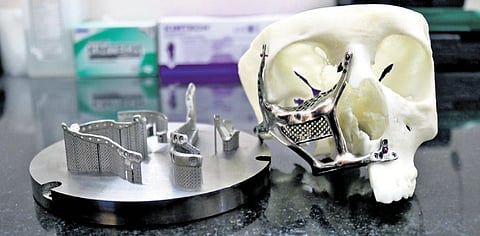

CHENNAI: The Indian Institute of Technology Madras (IIT-M) has developed cost-effective 3D-printed face implants for patients suffering from black fungus, a condition reported in COVID-19 patients as well as those with uncontrolled diabetes, HIV/AIDS and other medical ailments. Around 50 of them have already been implanted in patients from economically weaker sections.
The initiative, based on 3D printing or additive manufacturing technology, is being carried out in partnership with ZorioX Innovation Labs, a start-up founded by dental surgeons in Chennai. Loss of facial features is among the most devastating effects of black fungus disease, also known as mucormycosis. Reports suggest that about 60,000 black fungus cases have been registered in India after the pandemic, according to a release from IIT-M.
The fungus invades facial tissues, causing necrosis and disfigurement. In severe cases, patients may lose their entire nose, eyes, or even their whole face. While reconstructive surgery is a viable solution, patient-specific implants and procedures are expensive, rendering them inaccessible for people from economically disadvantaged sections of society.
“Additive manufacturing (3D printing) has already emerged as a viable and cost-effective manufacturing process for low volume production of complex body implants. Extensive research is already being carried out in IIT-M, regarding the prospects of commercialising this technology for printing patient-specific implants in stainless steel, Ti-6Al-4V and Co-Cr-Mo alloys,” said Murugaiyan Amirthalingam, associate professor, department of metallurgical and materials engineering, IIT-M.
Using unique in-house algorithms, a patient’s MRI/CT data is converted to a printable CAD format and custom implants are printed from medical-grade titanium using an indigenously built laser powder bed facility inside IIT-M. Researchers then identify patients who cannot afford costly implants and give them the new 3D-printed ones free of cost under the initiative named #Right2Face. This initiative aims to help poor black fungus patients access patient-specific custom maxillofacial implants, Murugaiyan added.